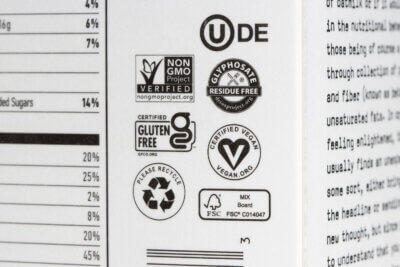 Depending on what market and retailer you are looking to establish your product, many retailers require specific certifications to be on your packaging.
Depending on what market and retailer you are looking to establish your product, many retailers require specific certifications to be on your packaging.
And, if the label is on your packaging, it is required to be packaged in a facility that is compliant with these specific requirements and certifications.
Below are some important plant certifications used in today’s food packaging world.
What does Kosher Certified mean?
Kosher certified means the food is prepared or packaged in accordance with Jewish dietary laws.
A Kosher food processed or cooked with non-kosher food or any derivative of a non-kosher becomes non-kosher. For example, food coloring derived from shellfish and used in a cake makes the cake non-kosher. In addition, meat and dairy products may not be made or consumed together.
Kosher means the product must be slaughtered in a prescribed manner to be kosher. Definitions of Kosher have evolved in response to changes in the food industry due to the growing complexity of food; the need arose for kosher certifying agencies to determine the kosher status of prepared food.
Today kosher certification labels are printed on the packages. There are different Jewish ethnic cultures, branches within Judaism, and certifying authorities in the United States that certify Kosher. In recent years gentiles (non-Jewish) have become increasingly interested in kosher food. In addition, many health-conscious people may purchase something kosher because they believe it is healthier and safer due to the different regulations.
What is a Gluten-Free Facility?
Put simply, a gluten-free facility is one that packages under a tolerable level of gluten.
Gluten-free means the facility can package under a tolerable level of gluten of 20 PPM. The current international Codex Alimentarius sets the standards for these levels. Most facilities will package products with gluten in them, but they can claim gluten-free as long as the levels are low.
Currently, there are no laws in the United States for labeling foods as gluten-free. This is because many of the inherently gluten-free grains, seeds, and flours are contaminated with gluten. By eating these, you have inadvertently consumed gluten, so there are no set laws on gluten-free food or facilities. However, date code labels are still required for all foods.
Gluten causes many problems, and most people with celiac disease can safely consume particular oats and seeds containing gluten. Just remember that because it says gluten-free does not mean there is no evidence of gluten.
Organic Certified Packaging
This type of facility is where the producer and packager adopt organic practices, and the USDA organic regulations recognize four categories.
- Crops — a plant grown to be harvested as food, livestock feed, fiber, or used as nutrients.
- Livestock — Animals that can be used for food, fiber, or feed
- Processed Products — Items that have been handled and packaged (chopped carrots) or combined processed and packaged.
- Wild Crops — Plants from a growing site that is not cultivated.
The handling facility may be certified by a private, foreign, or state-run organization that the USDA accredits. Certifying agents are responsible for ensuring that USDA organic products meet the standards set forth by the certification.
To learn more about organic certification, you can visit www.1.usa.gov/organic-certification.
At Assemblies, our packaging specialists can meet the demand of most food packaging projects. Simply complete the Request For Quote form or call our office to start a discussion.
